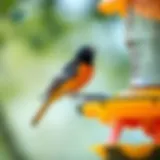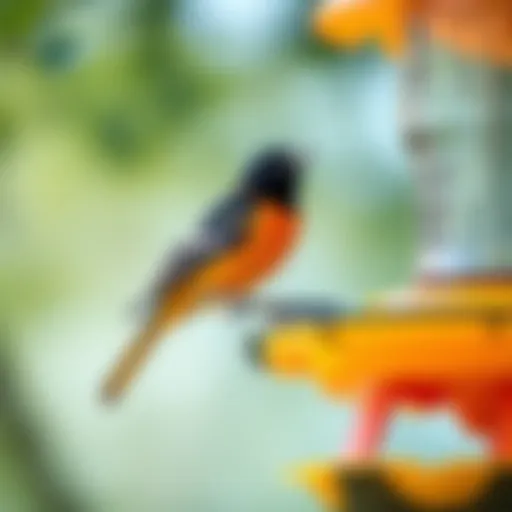Choosing the Best Diet for Your Budgie

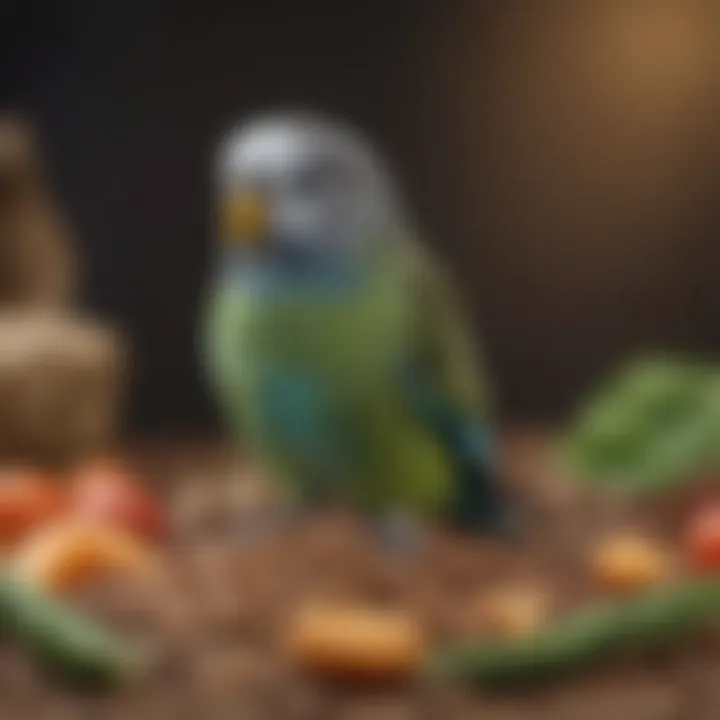
Intro
Choosing the right food for your budgie isn't just a trifling matter; it's a cornerstone of their health and happiness. With so many options out there, pet bird owners can feel like a deer caught in headlights. This guide will help illuminate the choices available and provide actionable insights into creating a balanced diet for your feathery friend.
A well-fed budgie is not only physically healthy but also mentally stimulated, which contributes to a more vibrant and engaging pet experience. After all, happy birds tend to sing sweeter tunes! In this journey, we will dissect the essentials of budgie nutrition, the types of food available, and the various factors that could influence your bird’s eating habits.
Avian Care Basics
To kick off, understanding some foundational aspects of avian care is essential. Nutrition is the linchpin here; without the right sustenance, your budgie could end up facing health issues down the line.
Importance of Proper Nutrition
Proper nutrition means different things to different species, but when it comes to budgies, it boils down to a balance of seeds, grains, fresh fruits, and vegetables. Unfortunately, many novice bird parents might opt for just seed mixes, thinking they provide everything a bird needs. However, this is a common misconception; many seed mixes lack the necessary vitamins and minerals essential for your bird’s growth and energy.
"Understanding what your budgie needs nutritionally is key to ensuring a long, healthy life for your companion."
Understanding Bird Species and Their Needs
Budgerigars have unique dietary requirements, influenced by their natural habitat. In the wild, they consume a wide variety of seeds, fruits, and vegetables, leading to a very diverse diet. Replicating this variety at home can help keep them happy and healthy.
Basics of Birds Habitat Setup
It’s not all about food; the environment plays a significant role too. A clean, spacious cage filled with appropriate toys and perches can create a healthy habitat for your budgie that complements their nutritional needs. Ensure their home is well-ventilated and free from drafts, as birds are very sensitive to temperature changes.
Grooming and Hygiene Tips
A bird's plumage speaks volumes about its health, so regular grooming is crucial. Budgies love to preen, but they also benefit from occasional baths or misting to keep their feathers in top shape. Hygiene also extends to their feeding area; keeping bowls clean prevents the growth of bacteria that could harm your bird.
As we look at the crucial elements of avian care, the journey of understanding and providing for a budgie’s needs continues into the realm of food selection. The next sections will delve into how to evaluate different dietary components and what you, as a budgie owner, should prioritize.
Understanding Budgie Nutrition
Understanding the nutritional needs of budgerigars isn’t just about getting the right food; it’s about ensuring your feathery friends thrive. Budgies, like any living creature, have unique dietary requirements that directly influence their health, mood, and overall quality of life. This section acts as a compass, guiding pet owners towards making the best choices for their birds.
A well-rounded diet can reduce health risks, prevent behavioral issues, and enhance your budgie’s quality of life. It’s a balancing act between various elements, which in turn influence how your budgie interacts with its environment and even with you.
As you navigate through the sea of budgie food options, it's essential to grasp the fundamentals of what makes up a healthy diet. Proper understanding can not only empower you as an owner but also foster a delightful bond with your pet bird.
The Importance of a Balanced Diet
When discussing budgie diet, the emphasis on balance cannot be overstated. A balanced diet provides the necessary components that support various bodily functions. Just like humans need a variety of food groups, budgies require a mix of seeds, grains, fruits, and veggies for a well-rounded meal. By ensuring that your budgie's plate is colorful and diverse, you’re helping ensure it gets all the nutrients it needs, from vitamins A and D to essential fatty acids.
A lack of variety can lead to several health issues. Common problems like obesity or malnutrition can manifest when a budgie is fed only seeds, for example. Seed diets are often high in fat and low in essential vitamins and minerals, creating a perfect storm for health problems down the line. Therefore, integrating fresh produce and specialized pellets into their regime is not simply beneficial; it’s absolutely crucial.
Here's a quick list of dietary components to strive for:
- High-quality seeds
- Pelleted feeds that contain balanced nutrition
- Fresh fruits and vegetables for vitamins
- Fresh water daily to keep hydration in check
Getting a jumpstart on nutritional education can simplify the feeding process. By choosing a balanced approach, you're not only providing sustenance but also enriching your budgie's life experience.
Common Nutritional Deficiencies
Just like we humans can experience deficiencies during certain phases of life, budgies can face similar challenges. One of the glaring deficiencies often observed is that of vitamin A. This vitamin is vital for vision, skin health, and a functioning immune system. A deficit can cause serious issues that can directly impact how budgies behave and maintain their health.
Additionally, iron and calcium deficiencies are prevalent. Without enough iron, birds may suffer from anemia, while a lack of calcium can lead to bone density issues, impacting their ability to move and perch comfortably.
Let’s break down some key nutritional deficiencies:
- Vitamin A: Necessary for good vision and a healthy immune system.
- Calcium: Essential for bone health.
- Iron: Inadequate iron can result in anemia and fatigue.
- Omega fatty acids: Important for feather health and overall vitality.
Furthermore, budgies can be picky eaters. If your bird only pecks at its favorite treats, it may willingly avoid other crucial food types. Keeping an eye on their eating habits can provide a clearer picture of their nutritional intake.
"Nutritional deficiencies in budgies could lead to a cascade of health problems that are often preventable with a well-rounded diet."
This understanding of nutritional needs aims to empower budgie owners for better dietary management. Awareness and education can significantly boost your bird's health, leading to a happier and more vibrant companion.

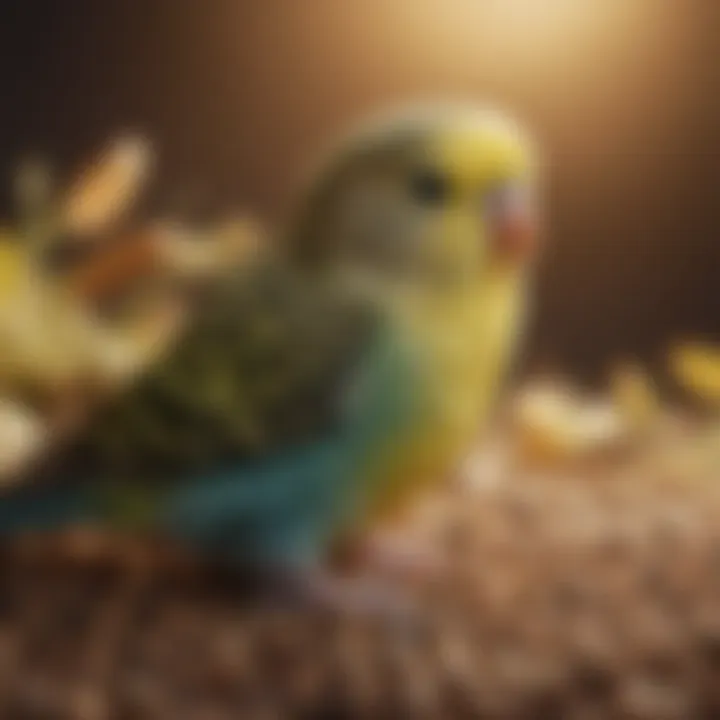
Essential Dietary Components
Choosing the right food for your budgie is not merely a matter of personal preference but is paramount for their overall health and vitality. A thoroughly thought-out diet serves as the foundation for your bird's well-being, preventing nutritional deficiencies and promoting longevity. This section aims to break down the core components that make up a high-quality diet for your budgie, covering everything from traditional options like seeds to modern solutions, ensuring you have the knowledge needed to make informed choices.
Seeds: The Traditional Staple
Seeds are often regarded as the go-to food for budgies. It's like the bread and butter of avian cuisine. They come in a myriad of varieties and, when fed properly, can offer a bedrock of essential nutrients. However, not all seeds are created equal. While they provide fats and carbohydrates that give energy, they lack in vital vitamins and minerals. A budgie's diet should ideally consist of a mix of seeds but shouldn't lean too heavy on any single type. Think of it as a buffet, not a singular dish.
When selecting seeds, choose a mix that incorporates a balance of different seeds such as millet, canary grass, and oats. This ensures that your feathered friend gets a rainbow of nutrients in every bite. But, as with everything, more doesn't always mean better. An excess of seeds, especially those high in fat, can lead to obesity and related health issues. Moderation is key; keep seeds as a significant, yet supplementary part of the diet.
Pellets: A Scientific Approach
Now, when talking about pellets, it's like entering a whole new ball game. Developed for optimal nutrition, pellets are designed using scientific insights into bird health. They’re meticulously formulated to include everything a budgie needs—vitamins, minerals, and amino acids—all rolled into one nifty package. The benefit of pellets is their consistency and ease of feeding. Birds can’t just pick out their favorite bits, like they do with seed mixes, which often leads to nutritional gaps.
When integrating pellets into your budgie's diet, it’s wise to introduce these gradually. Start by mixing pellets with seeds to help them get used to the new textures and flavors. This method smoothes the transition and helps ensure your budgie doesn’t turn their beak up at them entirely. Remember, while pellets are effective, they shouldn’t be the sole item on the menu; they work best when used in conjunction with other fresh foods.
Fresh Fruits and Vegetables
Ah, fresh produce! The vibrant colors and enticing smells make this component truly delightful for both the bird and owner. Fruits and vegetables provide essential vitamins and minerals that bolster the immune system and promote overall health. They help keep your budgie's feathers sleek and shiny, which is not just for aesthetics; it's a sign of good health.
Some excellent offerings include carrots, spinach, broccoli, and apples (just remember to remove seeds!). Not only do fresh foods add variety, but they also enrich a budgie's diet dramatically. This is not just about fueling but about ensuring that your bird can thrive. Just keep an eye on portions—too much fresh food can lead to digestive troubles. It's a tightrope walk that requires some practice.
Water: The Overlooked Essential
Water—it's often taken for granted, right? But for budgies, it’s absolutely crucial. They need access to clean, fresh water every day, as it's fundamental to their health. Water not only aids digestion but also helps maintain proper bodily functions. Without it, a budgie may quickly become dehydrated, leading to serious health issues even before you know it.
Use a sturdy water dispenser that is easily accessible to your feathered companion. Make sure to change the water daily. It's a small task that can make a big difference. Sometimes, it can be helpful to add fruits like oranges or watermelons into their diet, as these contain moisture and offer a fun twist to their hydration routine.
"Remember, a balanced diet is a budgie's best friend. By mixing seeds, pellets, fresh fruits, and vegetable, along with ensuring water is readily available, you’re paving the way for a healthier, happier budgie."
Types of Budgie Food Available
Selecting the right food for your budgie is crucial to maintaining their overall health and well-being. Different types of budgie food offer various benefits, and understanding these options can have a significant impact on your pet’s nutrition. This section delves into the common types of budgie food available, each with its unique attributes, pros, and cons.
Commercial Seed Mixes
Commercial seed mixes are often the go-to choice for many budgie owners. These mixes typically contain a variety of seeds designed to cater to the diverse dietary needs of these birds. When choosing this option, it is important to look for mixes that include high-quality seeds like millet, canola, and oat grains. Unfortunately, not all seed mixes are created equal; some might be filled with cheap filler seeds that aren’t nutritious.
Here are some things to consider:
- Variety: A good seed mix should have a variety of seeds to ensure balanced nutrition.
- Freshness: Check the packaging for a production date to ensure freshness, as stale seeds lose vital nutrients.
- Additives: Some mixes fortify seeds with vitamins and minerals. However, avoid those with unnecessary artificial colors or flavors.
"The right commercial seed mix can set the stage for a healthier and happier budgie, boosting energy levels and overall well-being."
Organic and Natural Options
Organic and natural budgie foods are gaining popularity among conscientious pet owners. These foods are often free from pesticides and artificial additives, making them a healthier choice for your feathered friend. Many brands offer organic seed mixes or certified natural foods that prioritize the health of the birds and the environment.
Benefits of choosing organic food include:
- Non-toxic: Free from harmful chemicals that could affect your budgie's health.
- Nutrient density: Organic grains might contain a higher concentration of nutrients, promoting better health.
- Sourcing: Many organic products support sustainable farming and minimize ecological impact.
On the flip side, organic options can sometimes be pricier, which might not fit everyone's budget. Remember, it's vital to read labels carefully to ensure you're making an informed choice.
Homemade Diets: Pros and Cons
Crafting a homemade diet for your budgie can sound appealing and provides a good way to control what goes into their food. However, this route comes with its own set of advantages and challenges.
Pros:
- Customization: You can tailor the diet specifically to your budgie’s needs and preferences.
- Freshness: Using fresh ingredients enhances nutritional value and eliminates the risks of expired store-bought products.
Cons:
- Nutritional Balance: It can be tricky to achieve the right balance of proteins, carbohydrates, vitamins, and minerals required for budgie health.
- Time-Consuming: Preparing homemade meals often requires more time and effort than simply opening a bag of seeds.
If you choose this route, ensure that you research thoroughly and perhaps consult with a veterinarian or avian specialist to help you create an effective dining plan for your bird.


Specialized Diets for Health Issues
Some budgies may require specialized diets tailored to specific health issues, such as obesity, liver problems, or digestive disorders. These diets often vary significantly from standard offerings because they are designed to address the unique needs of the bird.
For example:
- Obesity: Low-fat pellets and high-fiber vegetables can help in weight management.
- Digestive issues: Budgies with sensitive stomachs might benefit from easily digestible foods, such as cooked vegetables and specific types of pellets.
- Liver health: A diet reduced in fat and increased in antioxidants can support liver function.
It's always best to consult a vet for personalized advice tailored to your budgie's particular health needs. This approach not only aids in improving their quality of life but also builds a stronger bond between bird and owner by addressing unique challenges together.
Evaluating Budgie Food Brands
When it comes to the well-being of your budgie, selecting the right food brand can be a pivotal choice. The variety of options available may feel overwhelming, but understanding how to evaluate these brands is essential to ensuring that your feathered friend gets the nutrients they need to thrive. With countless companies vying for attention in the avian market, it's vital for bird owners like you to distinguish between brands that genuinely prioritize budgie health and those that simply ride the coattails of a popular trend.
Label Reading and Ingredient Analysis
Reading labels on budgie food packets may seem like a mundane task, but it's the beacon that guides you toward informed choices. The first aspect to pay attention to is the ingredient list. Ideally, quality budgie food should list whole grains, quality seeds, and a variety of nutrients. If the ingredients contain fillers, artificial colors, or sugars, it's advisable to steer clear.
Consider the following points when evaluating labels:
- First Ingredient: This should ideally be a high-quality seed or grain, as it makes up the bulk of the formula.
- Nutritional Information: Look for essential vitamins and minerals, including omega fatty acids, which are crucial for a budgie's health.
- No Mystery Additives: Avoid products with lengthy ingredient lists full of vague terms.
- Freshness Date: Check for any dates indicating how fresh or recently packaged the food is.
Understanding these elements allows you to make rankings based on not just hype, but substantial proof of quality.
"Reading labels is not just a chore; it’s an investment in your budgie’s health."
Reputable Brands and Recommendations
After you familiarize yourself with label reading, it’s crucial to know which brands have gained a trustworthy reputation in the world of budgie food. Research shows that established brands tend to undergo rigorous testing procedures to ensure that their products meet the nutritional needs of birds. Popular among fellow pet owners, brands such as Harrison’s Bird Foods, ZuPreem, and Kaytee frequently come up as recommended choices. Here's why:
- Harrison’s Bird Foods: Known for its organic ingredients and high nutritional value, particularly for those looking to embrace a more holistic approach.
- ZuPreem: Offers a range of textures and flavors, catering to picky eaters while ensuring essential vitamins are included.
- Kaytee: Provides various formulations, including tailored diets for specific health issues, showing versatility in addressing different needs.
Research within communities such as reddit.com and facebook.com can also reveal what pet owners are saying about these brands. User-generated reviews and recommendations often provide insight that professional sources may not delve into.
In summary, understanding how to evaluate budgie food brands is not just about picking a name that sounds good, but about ensuring that the food you offer is both nutritious and safe. Give your budgie the best care possible by making informed, thoughtful decisions about their diet.
Impact of Age and Activity Level
Understanding how age and activity levels influence a budgie's dietary needs is essential for any bird owner keen on fostering a healthy companion. Just like humans, budgies go through different life stages, and their nutritional requirements change accordingly. Young budgies, or chicks, are not just growing in size, but they’re also developing their feathers, bones, and immune systems. Their food must reflect these complex needs, ensuring that they get the right balance of nutrients to support their rapid growth.
On the contrary, older budgies often require adjustments to their diet. As they age, their metabolism slows, and they may become less active. This shift necessitates a reduction in calorie intake to prevent obesity, which can lead to various health issues. Moreover, aging budgies may experience dental wear that makes eating more challenging, prompting the need for softer food options.
"The diet of a budgie isn't just about feeding; it's about understanding their life cycle and adapting accordingly."
In addition to age, a budgie's activity level plays a pivotal role in its nutritional needs. A highly active budgie would burn more energy and thus require more calories and proteins compared to a more sedentary one. For instance, you might observe that a budgie that loves to fly and play with toys craves more seeds and pellets to fuel its dynamic lifestyle.
In summary, a budgie's age and activity level not only dictate the types of food it should consume but also the amount. As conscientious pet owners, it’s important to be attentive and observant, ensuring our feathered friends thrive in every stage of their lives.
Dietary Changes for Growing Budgies
When it comes to feeding juvenile budgies, the focus should be on promoting robust growth and development. Young budgies, generally under six months old, undergo significant changes, requiring diets rich in essential nutrients.
A diet that leans heavily on high-quality pellets alongside a selection of seeds is often beneficial. Pellets are designed to provide a balanced blend, containing crucial vitamins and minerals that might be lacking in seed mixes. Fresh vegetables are also key players during this period; incorporating varieties such as spinach, broccoli, and carrots boosts their nutrient intake. Offering them in small, bite-sized pieces makes it easier for young budgies to manage. Next, let’s not overlook protein sources. Protein is vital for growth, and incorporating small amounts of boiled egg or a protein-specific budgie mix can work wonders. Budgies thrive on variety, so regularly rotating available foods can keep their diet exciting and nutritionally balanced.
Adjusting Food for Seniors
As budgies age, they present unique challenges and require dietary adjustments that cater to their evolving needs. In the case of elderly budgies, generally considered to be around eight years and older, it’s crucial to pivot away from high-calorie, high-fat diets typical of younger, more active birds.
First and foremost, seniors may benefit from softer food textures. Their chewing abilities might diminish, making it harder to crack open tougher seeds. Transitioning to softer pellets, moistened seeds, or even blending vegetables into a mash can help them enjoy their meals without hassle.
Moreover, older budgies are more prone to health problems like obesity and kidney issues. Thus, it’s wise to monitor calorie intake carefully. A mix of low-fat seeds, pellets, and a variety of fresh veggies should be prioritized, limiting their access to purely seed-based diets.
Lastly, keep an eye on hydration; older birds are at a higher risk of dehydration. Fresh, clean water must always be available, and consider adding water-rich fruits like watermelon or cucumber to their menu. It's all about adapting their diet as they age to maintain a truly healthy life into their twilight years.
Behavioral Factors Influencing Food Choices
Understanding the complexities of budgie behavior is crucial when it comes to selecting their food. Just like humans, budgerigars develop preferences that can influence what they eat. Knowing these behavioral factors can make a significant difference in ensuring your feathered friend gets the balanced diet they need.

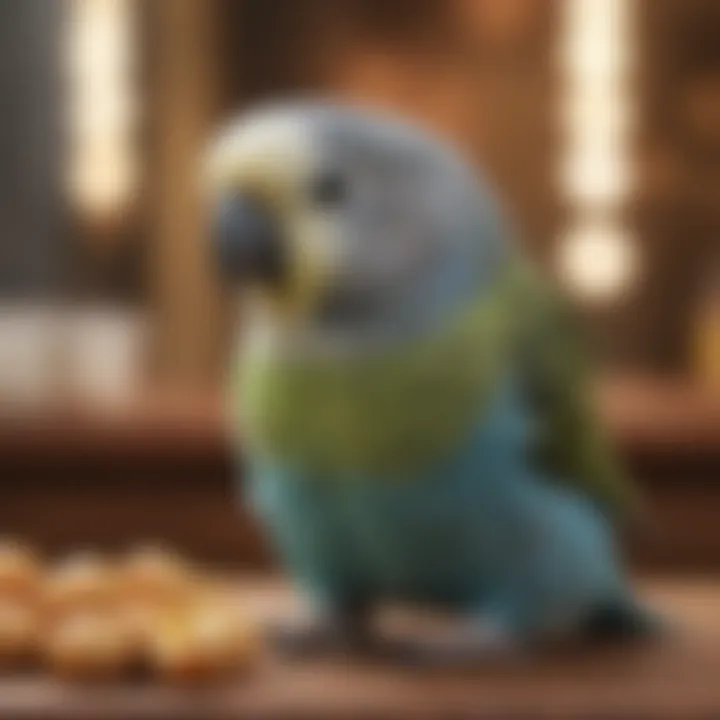
Social Feeding and Pecking Order
Birds are inherently social creatures; they thrive in environments where they can interact with their flock. Budgies engage in social feeding, where they not only share food but also influence one another's dietary choices. For instance, if one budgie shows a preference for a certain seed or fruit, others may mimic that behavior, leading to communal eating habits.
Additionally, the concept of pecking order plays a vital role. In a multi-budgie household, dominant birds often dictate food availability and access. Lesser-ranked budgies may find themselves at the bottom of the pecking order, leading to potential food-related stress and nutritional imbalances. It’s important to observe behaviors during feeding times and adjust the setup to ensure all budgies get their fair share. Here are a few tips to foster good eating habits among your flock:
- Provide Multiple Feeding Stations: This minimizes competition and helps weaker birds access food easily.
- Rotate Food Variety: Keep things interesting by changing the types of food offered, reducing monotony and encouraging exploration.
- Monitor Eating Habits: Identifying which budgie avoids certain foods can signal dietary deficiencies and the need for intervention.
The Role of Environment in Eating Habits
The environment where budgies live significantly affects their eating habits. Budgies are sensitive to stimuli around them, including sound, movement, and even other pets in the house. An environment that feels secure and stimulating will encourage natural foraging behaviors, making them more likely to explore a variety of foods. Here are some key aspects to consider when creating a conducive environment for your budgies:
- Spatial Arrangement: Place food and water sources in contrasting locations, promoting exploration.
- Interactive Toys: Incorporating toys that dispense food can mimic foraging activities, stimulating interest in different types of foods.
- Comfortable Temperature and Light: Ensure a balanced atmosphere; too hot or too bright could discourage eating. Also, consistent light exposure mimics natural conditions, promoting a better feeding routine.
Fostering an enriching environment not only supports healthy eating habits but can also alleviate boredom, positively affecting the overall well-being of the budgies.
By understanding and manipulating these behavioral factors, you’re not only improving your budgies' diet but also enhancing their quality of life. Every little adjustment can lead to vast changes in how they approach their meal, setting the groundwork for long-term health and happiness.
Common Feeding Mistakes
When it comes to feeding budgies, even seasoned bird owners can trip over common misunderstandings and habits that might not serve their feathered companions well. Understanding and avoiding these pitfalls are vital to ensuring your budgie thrives. A well-rounded diet enhances their vibrancy, energy, and overall health. Recognizing mistakes can mean the difference between a chirpy, healthy budgie and one prone to sickness.
Over-reliance on Seed Mixes
Many budgie owners believe that a seed mix is sufficient for their pet's nutrition since they are often the most accessible and well-advertised option. However, relying solely on these mixes can create serious issues.
Seed mixes can lack essential vitamins and minerals. While they might sport a colorful array of seeds, these mixes can be deceptively low in the nutrients that budgies need. Often, many of the seeds—most notably sunflower seeds—are high in fat, which can lead to obesity if consumed in excess.
It's crucial to balance out seed diets with plenty of pellets and fresh options. If your budgie plays favorites and just picks out the seeds they fancy, it could lead to severe nutritional imbalances. Consider incorporating other food types gradually into their diet, ensuring they receive a variety of nutrients.
Neglecting Fresh Foods
When preparing meals, it can be tempting to go heavy on seeds and commercial pellets, but that would overlook one important aspect: fresh foods. Budgies, like humans, benefit greatly from fresh fruits, vegetables, and greens. Ignoring this significant food group can deprive them of vital antioxidants, vitamins, and minerals that keep their feathers shiny and their energy levels high.
Consider this list of beneficial fresh foods:
- Leafy greens: spinach, kale, and romaine
- Fruits: apples (without seeds), bananas, and berries
- Vegetables: carrots, bell peppers, and broccoli
It’s essential to wash fresh foods thoroughly and cut them into manageable pieces. Introduce new items slowly to prevent digestive upset and ensure your budgie gets a balanced diet. Always keep an eye on which foods your bird enjoys and which to avoid, as some fruits and vegetables can be harmful.
Ignoring Dietary Changes with Seasons
Lastly, ignoring the seasonal aspects of your budgie's diet can lead to poor health outcomes. Just like humans, budgies experience different nutritional needs as temperatures change. In colder months, they might need more fats and calories to maintain energy levels. Conversely, in warm weather, a diet low in fat and higher in moisture content is often beneficial.
A seasonal approach can enhance their well-being:
- In summer, fresh fruits and veggies should take the spotlight, providing hydration and essential nutrients.
- In winter, consider adding oat, corn, or even some healthy grains to help them with the cold.
Model ّ User ّ Thank you ّ Expertise ّ In-formal Understanding ّ Feel Free ّ Introduce ّ Add ّ Personal ّ Writing ّ Format ّ Perfect ّ Maintain ّ Step ّ Follow ّ Efforts ّ See ّ Best ّ Outcome ّ Practice ّ Abound ّ Commands ّ Ensure ّ Effective ّ Rightful ّ Track ّ Lists ّ Needed ّ Following ّ Guidance ّ Competent ّ Grounded ّ Focus ّ Crafting ّ Outline ّ Wide ّ Acquiring ّ Suggestions ّ Merging ّ Responsibilities ّ Heads ّ Communication ّ Progress ّ Descriptive ّ Rise ّ Values ّ Distinction ّ Plenty ّ Final ّ Heartfelt ّ Ultimately ّ Found ّ Followed ّ Environment ّ Path ّ Voice ّ Hand-in-hand ّ #Quality ّ Values ّ Offering ّ Care ّ Plans ّ Period ّ Draw ّ Real ّ Future ّ Closing ّ Given ّ Standard ّ Make-out ّ Compromise ّ Present ّ Purpose ّ Step ّ Handling ّ Overall ّ Changes ّ Safety ّ Holding ّ More ّ Honey ّ Together ّ Future ّ Sanders ّ Crazy ّ Zones ّ Close ّ Sight ّ Absolutely ّ #Curves ّ Flows ّ Going ّ Aspect ّ Efficient ّ Ample ّ Vibrant ّ Feathers ّ Withstand ّ Reach ّ Affirm ّ Values ّ Grasp ّ Enable ّ Personal ّ Winners ّ Framework ّ Bends ّ Choices ّ All ّ Unfortunately ّ Strong! ّ Let ّ Healing ّ Appreciate ّ Quotations ّ Settle ّ Arrive ّ Power ّ Transparency ّ Angers ّ Unequal ّ Personal ّ Ally ّ Considerable ّ Well-being ّ Significance ّ Mix-out ّ Minding ّ Focused ّ Results ّ Leaving! ّ Instead ّ Best ّ Partners ّ Another ّ Checked ّ Recommendations ّ True ّ ChiPoints ّ Pacing ّ Communal ّ Expires ّ Fancy ّ Shortcomings ّ Shift ّ Roadways ّ Aside! ّ Months ّ Enormous ّ Hoping ّ Final ّ Uncertain ّ Adventures ّ Clarity ّ Effortlessly ّ Loopholes ّ Timeline ّ Conversation ّ Finding ّ Ultimately ّ Choices ّ Outcome ّ Skill ّ Feeding ّ Ways ّ Match ّ Necessary ّ Power ّ Bouncing ّ Effectively ّ Passion ّ Wisting ّ Comfort ّ Finely ّ Companionship ّ Yes ّ Flawlessness ّ Withstand ّ Follow ّ Matched ّ Study ّ Introduced ّ Strength ّ Exchanges ّ Mindful ّ Powerful ّ Affairs ّ Definitely ّ Responses ّ Expand ّ Linked ّ Accomplishments ّ Values ّ Hm ّ Times ّ Back ّ There's! ّ Credit ّ Greatly ّ Avoid ّ Variables ّ Practice ّ Where-ed ّ Our ّ Practices ّ Come ّ Safe ّ Changes ّ Fits ّ Let’s ّ██ Always ّ Care ّ Each ّ Safely ّ Quick ّ Solutions ّ Glad ّ Abundant ّ Providing ّ Fulfilling ّ Abound ّ Melding ّ Capable ّ Gather ّ Knowledge ّ Safe ّ Cheerfully ّ Followed ّ Railways ّ Polarizable ّ Despite ّ Pathways ّ Living ّ Come ّ Shifting ّ Where ّ Focus ّ Acquiring ّ Take ّ Combine ّ Loving ّ Put forth ّ Collaborate ّ Intentions ّ Thin ّ Pays
Culmination: Crafting the Ideal Diet
In wrapping up our exploration of budgie nutrition, it's essential to understand that crafting the ideal diet is not just about picking food off the shelf. It’s about creating a balanced and varied diet that meets the specific needs of your budgie. A well-thought-out diet contributes significantly to their overall well-being, preventing health issues and ensuring they live a long and happy life.
Summarizing Key Points
Let’s take a moment to highlight the key elements that we’ve discussed:
- Understanding Nutrition: Budgies require a diverse range of nutrients, including proteins, vitamins, and minerals. An understanding of their nutritional needs forms the backbone of a healthy diet.
- Dietary Components: Seeds, pellets, fresh fruits, vegetables, and water—the basic components of their diet—should be part of their daily meals. Each plays a unique role, ensuring your bird gets everything it needs.
- Types of Food: With options ranging from commercial seed mixes to homemade diets, selection should be based on quality and the specific health needs of your bird.
- Behavioral Aspects: Consider the social dynamics and living environment, as these can influence feeding habits and preferences.
- Avoiding Pitfalls: Common mistakes, like relying solely on seed mixes or neglecting fresh foods, need to be avoided for optimal health.
It's clear that successful budgie care goes beyond mere feeding; it requires knowledge and commitment.
Encouraging Varied Diet for Optimal Health
The best way to maintain a budgie’s health is to encourage a varied diet. Just like people, budgies thrive on diversity. Here are some vital considerations for fostering a varied diet:
- Rotate Foods: Introducing new foods regularly can keep your budgie intrigued and engaged at meal times. This doesn’t just make feeding time more enjoyable, but also ensures they are less likely to develop picky eating habits.
- Fresh Selection: Make fresh fruits and vegetables a staple in their diet. Not only do these provide essential vitamins, but they also offer hydration. Veggies like carrots, spinach, and fruits such as apples and berries should make regular appearances in their meals.
- Monitor Preferences: Pay attention to what your budgie enjoys. Tailoring their diet to include foods they gravitate toward can enhance their overall diet satisfaction.
- Seasonal Adjustments: Change their food offerings with the seasons; fresh produce varies throughout the year and can be more appealing as it reflects seasonal changes, keeping things exciting.
A varied diet means a healthier budgie, and a well-nourished pet is a happy pet. By taking the time to curate their meals thoughtfully, owners can promote vibrant health and a joyful life for their feathered companions.
"Informed choices, made with care, make all the difference in your budgie's world."
To create a complete feeding strategy that considers both your budgie’s preferences and nutritional requirements, take the time to observe, prepare, and adapt their diet accordingly. With dedication and knowledge, you can truly foster a thriving environment for your budgie.




